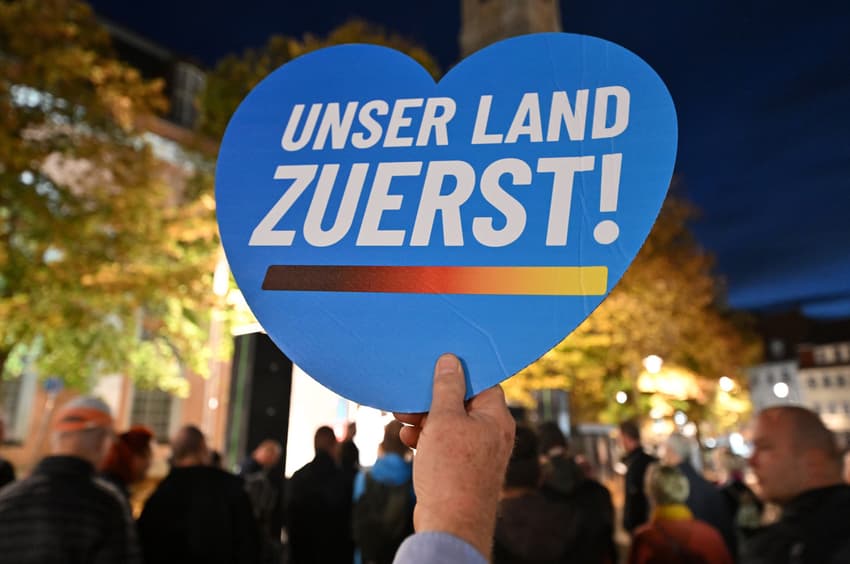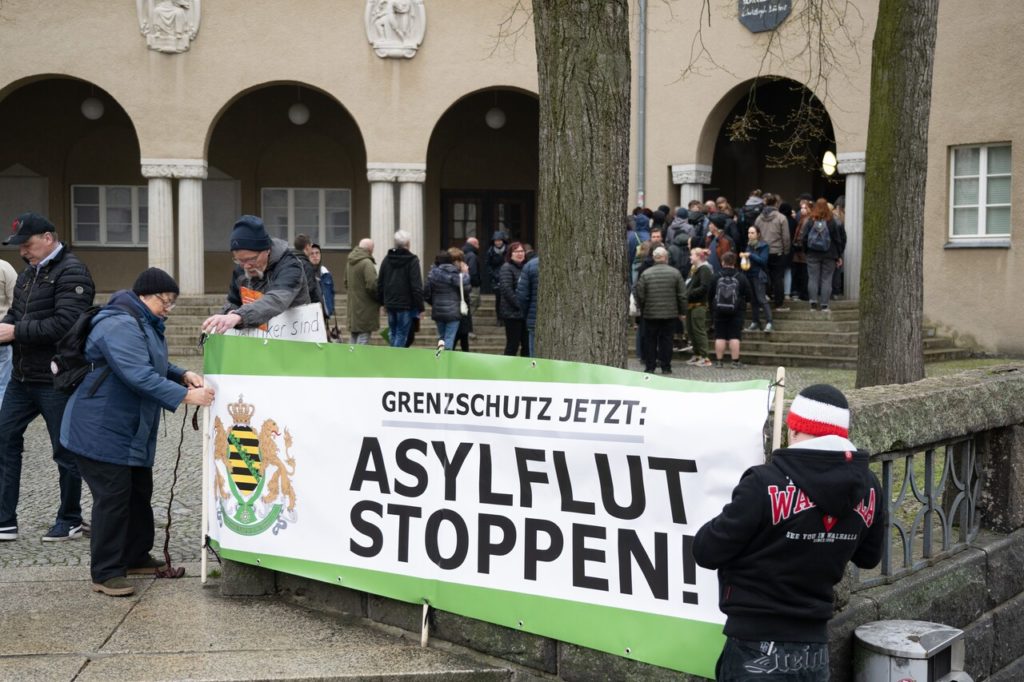ANALYSIS: Are far-right sentiments growing in eastern Germany?

Two election victories for the Afd in two eastern German states, coupled with alarming results from a new study by the University of Leipzig, suggest that right-wing sympathies may be on the rise in Germany’s East.
On Sunday, Hannes Loth of the far-right Alternative für Deutschland (AfD) made history by becoming the first-ever mayor from his party in Germany. He emerged victorious in the mayoral election held in Raguhn-Jessnitz, Saxony-Anhalt, defeating independent candidate Nils Naumann.
The victory followed another recent success for the AfD when Robert Sesselmann was elected district administrator in the Sonneberg district of Thuringia last week, securing 52.8 percent of the vote.
Though the two districts are relatively small, these wins underscore the AfD's ability to appeal to a substantial portion of voters in eastern Germany.
READ ALSO: Why the far-right AfD's victory in an east German district is so significant
Last week, the results of a new study by the Else-Frenkel-Brunswik Institute of the University of Leipzig also revealed that many people in eastern Germany hold extreme right-wing opinions.
The study - a representative survey of 3,546 people in the former eastern German states of Brandenburg, Mecklenburg-Western Pomerania, Saxony, Saxony-Anhalt, Thuringia and east Berlin - demonstrated a high level of approval for right-wing extremist statements.
Almost one in two respondents in the study said that they believe that foreigners only come to Germany to exploit the welfare state, while more than one in three think that the Bundesrepublik is already "dangerously over-filled". Likewise, more than one in three called for "finally more courage for a strong national feeling" and one in four said that Germany should be tough and energetic in asserting its interests abroad.
Chauvinistic and xenophobic statements were only rejected by a minority of respondents, the study's directors Oliver Decker and Elmar Brähler said when presenting the results in Berlin last week.
Approval for right-wing statements was particularly pronounced in the states of Saxony, Saxony-Anhalt and Thuringia, where every second person asked said they wanted a 'strong party' that embodies the 'national community' as a whole.
"Here, the potential for extreme-right and neo-Nazi parties to find voters is thus particularly high," Elmar Brähler, Professor Emeritus of Medical Psychology and Medical Sociology at the University of Leipzig, said.

Participants of a rally of the right-wing extremist party Freie Sachsen (Free Saxony) hold a banner with the inscription "Asylflut Stoppen" (Stop the flood of asylum seekers) in Görlitz. Photo: picture alliance/dpa | Sebastian Kahnert
In conducting the study, the researchers went from house to house in all five eastern German states and in east Berlin. They brought questionnaires with them, letting the respondents fill them out at their leisure and putting their answers in envelopes, to ensure that everyone gave information as they really thought and that no false consideration was given to what the interviewers might think.
READ ALSO: Far-right AfD overtakes Germany's Social Democrats in polls
Also clearly present, though still minority opinions, were downplays of the National Socialist era. Seven percent agreed with the statement that "without the extermination of the Jews, Hitler would be regarded as a great statesman", while six percent thought that the crimes of National Socialism have been greatly exaggerated in the writing of history and that National Socialism also had its good sides.
Why are these views so pronounced in the east?
According to the researchers, economic concerns don't seem to be such an important influencing factor in the right-wing attitudes as one might think, given that wages are typically lower in eastern Germany than in the west.
READ ALSO: Is the energy crisis causing a new divide between eastern and western Germany?
Though the study found that, in the eastern German states, between 29 and 39 percent are worried about the German economy as a whole, only around 15 percent considered their own situation as bad; the rest seemed to be satisfied or at least not dissatisfied with it.
According to the research, the experiences of the GDR still shape the attitudes of people in East Germany today.
"A quarter feel like losers of the Wende, not even half would like to call themselves winners. In retrospect, satisfaction among respondents with their life in the GDR is high," explained Oliver Decker, Director of the Else-Frenkel-Brunswik Institute for Democracy Research at the University of Leipzig.
Two-thirds of those surveyed said that they missed the GDR.
Fears of an increasing divide
In response to the AfD's recent victories in eastern Germany, Saxony's Minister President Michael Kretschmer has warned of increasing polarisation in Germany.
"Something is slipping in this country," the CDU politician told the newspapers of the Funke-Mediengruppe on Sunday.
He said that one of the reasons for the AfD's recent success is the fact that people are "disturbed" by how politics is being done in Germany.
"The energy transition, the heating law, refugee policy and the Russia embargo brought the AfD victory. These issues threaten to tear society apart," Kretschmer said, and argued that politicians are resorting to "blame and demarcation instead of dealing with unpleasant truths".
"We are on the way to polarisation, as we know it from America. The debates in recent weeks don't show that everyone understands that."
Comments
See Also
On Sunday, Hannes Loth of the far-right Alternative für Deutschland (AfD) made history by becoming the first-ever mayor from his party in Germany. He emerged victorious in the mayoral election held in Raguhn-Jessnitz, Saxony-Anhalt, defeating independent candidate Nils Naumann.
The victory followed another recent success for the AfD when Robert Sesselmann was elected district administrator in the Sonneberg district of Thuringia last week, securing 52.8 percent of the vote.
Though the two districts are relatively small, these wins underscore the AfD's ability to appeal to a substantial portion of voters in eastern Germany.
READ ALSO: Why the far-right AfD's victory in an east German district is so significant
Last week, the results of a new study by the Else-Frenkel-Brunswik Institute of the University of Leipzig also revealed that many people in eastern Germany hold extreme right-wing opinions.
The study - a representative survey of 3,546 people in the former eastern German states of Brandenburg, Mecklenburg-Western Pomerania, Saxony, Saxony-Anhalt, Thuringia and east Berlin - demonstrated a high level of approval for right-wing extremist statements.
Almost one in two respondents in the study said that they believe that foreigners only come to Germany to exploit the welfare state, while more than one in three think that the Bundesrepublik is already "dangerously over-filled". Likewise, more than one in three called for "finally more courage for a strong national feeling" and one in four said that Germany should be tough and energetic in asserting its interests abroad.
Chauvinistic and xenophobic statements were only rejected by a minority of respondents, the study's directors Oliver Decker and Elmar Brähler said when presenting the results in Berlin last week.
Approval for right-wing statements was particularly pronounced in the states of Saxony, Saxony-Anhalt and Thuringia, where every second person asked said they wanted a 'strong party' that embodies the 'national community' as a whole.
"Here, the potential for extreme-right and neo-Nazi parties to find voters is thus particularly high," Elmar Brähler, Professor Emeritus of Medical Psychology and Medical Sociology at the University of Leipzig, said.

In conducting the study, the researchers went from house to house in all five eastern German states and in east Berlin. They brought questionnaires with them, letting the respondents fill them out at their leisure and putting their answers in envelopes, to ensure that everyone gave information as they really thought and that no false consideration was given to what the interviewers might think.
READ ALSO: Far-right AfD overtakes Germany's Social Democrats in polls
Also clearly present, though still minority opinions, were downplays of the National Socialist era. Seven percent agreed with the statement that "without the extermination of the Jews, Hitler would be regarded as a great statesman", while six percent thought that the crimes of National Socialism have been greatly exaggerated in the writing of history and that National Socialism also had its good sides.
Why are these views so pronounced in the east?
According to the researchers, economic concerns don't seem to be such an important influencing factor in the right-wing attitudes as one might think, given that wages are typically lower in eastern Germany than in the west.
READ ALSO: Is the energy crisis causing a new divide between eastern and western Germany?
Though the study found that, in the eastern German states, between 29 and 39 percent are worried about the German economy as a whole, only around 15 percent considered their own situation as bad; the rest seemed to be satisfied or at least not dissatisfied with it.
According to the research, the experiences of the GDR still shape the attitudes of people in East Germany today.
"A quarter feel like losers of the Wende, not even half would like to call themselves winners. In retrospect, satisfaction among respondents with their life in the GDR is high," explained Oliver Decker, Director of the Else-Frenkel-Brunswik Institute for Democracy Research at the University of Leipzig.
Two-thirds of those surveyed said that they missed the GDR.
Fears of an increasing divide
In response to the AfD's recent victories in eastern Germany, Saxony's Minister President Michael Kretschmer has warned of increasing polarisation in Germany.
"Something is slipping in this country," the CDU politician told the newspapers of the Funke-Mediengruppe on Sunday.
He said that one of the reasons for the AfD's recent success is the fact that people are "disturbed" by how politics is being done in Germany.
"The energy transition, the heating law, refugee policy and the Russia embargo brought the AfD victory. These issues threaten to tear society apart," Kretschmer said, and argued that politicians are resorting to "blame and demarcation instead of dealing with unpleasant truths".
"We are on the way to polarisation, as we know it from America. The debates in recent weeks don't show that everyone understands that."
Join the conversation in our comments section below. Share your own views and experience and if you have a question or suggestion for our journalists then email us at [email protected].
Please keep comments civil, constructive and on topic – and make sure to read our terms of use before getting involved.
Please log in here to leave a comment.